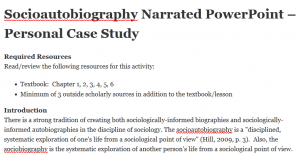
Required Resources
Read/review the following resources for this activity:
- Textbook: Chapter 1, 2, 3, 4, 5, 6
- Minimum of 3 outside scholarly sources in addition to the textbook/lesson
Introduction
There is a strong tradition of creating both sociologically-informed biographies and sociologically-informed autobiographies in the discipline of sociology. The socioautobiography is a “disciplined, systematic exploration of one’s life from a sociological point of view” (Hill, 2009, p. 3). Also, the sociobiography is the systematic exploration of another person’s life from a sociological point of view.
For this assignment, you will be doing one of those (your socioautobiography) in the form of a Narrated PowerPoint, and for Week 7, you will interview an adult of your choice to create a sociobiography, then, also in the form of a Narrated PowerPoint.
For this week’s socioautobiography Narrated PowerPoint, you will reflect on your own life story, making connections between your everyday life/life story and the broad sociocultural structures within which you live. To begin this assignment, consider your own life as you review all the textbook readings and online weekly lessons and decide which sociological concepts you wish to explain in connection to a part or parts of your own life story. Focus on vocabulary words in bold in your textbook reading, for example, and decide which terms apply to you and to your life story.
Reflect
As you consider your own life consider the following questions:
- How might a sociologist introduce you?
- How have social influences shaped you?
- What were the social forces that constructed your life or lifestyle?
- How have you negotiated the crisscrossing pressures of autonomy and conformity?
- Who are you in social context and what does it mean to understand your life using the “sociological imagination,” or utilizing a sociological perspective?
- What sociological concepts would be most helpful in understanding and interpreting your life experiences, whether class, or reference group, conformity, agents of socialization, gender socialization, racial socialization, norms, roles, significant others, total institutions (particularly if you were in the military), achieved status, ascribed status, deviance, subculture, culture, culture shock, ethnocentrism, folkways, mores, peer groups, and any others described in the textbook chapters, to interpret your life experiences?
- What events, moments or relationships in your life have impacted you significantly?
Include the following in your analysis:
· Quotes or paraphrases and citations from both outside scholarly sources and assigned readings (online Lessons or textbook readings), to support your observations in your presentation.
· 6 different concepts, keywords, or vocabulary words from Chapters 1-6 in your analysis and observations on your slides, formatted in boldface and underlined on slides.
o You may repeat these 6 terms throughout the PowerPoint presentation if you want to, but you are not required to.
Instructions
For this personal case study project, you are required to create a narrated PowerPoint presentation with audio and/or video within the PowerPoint. The audio/video must be part of the PowerPoint file. Audio/video may not be external to the presentation and you must submit a .ppt file extension PowerPoint file.
The presentation must include the following:
- Part or Parts of Your Own Life Story: Explain and analyze your life story or parts of your life story as a sociologist might, examining sociological categories relevant to your life story.
- Include details of family, culture, and background.
- Consider what types of categories a sociologist might use to describe you.
- Engagement: Be sure to deliver the presentation in a professional and engaging manner.
- Visual Aids: Include photos or symbols that represent the sociological concepts you are analyzing in your presentation. But if you use any images from the Internet or from any sources other than your own personal photographs, you must include citations for those and those citations are *not* part of your required 3 outside scholarly sources plus the online Lesson or textbook.
- Key Words in Bold and Underlined: Be sure to include 6 different concepts, keywords, or vocabulary words from Chapters 1-6 in your analysis and observations on your slides, formatted in boldface and underlined on slides
- Visual Appeal and Organization: Do not include slides with large blocks of text. Use bullet points, brief text, speaker notes, and clear organization to create an organized and visually appealing presentation.
- Citations: Include parenthetical in-text citations in the slide presentation citing at least 3 outside scholarly sources and assigned textbook/lesson reading to support observations made in the presentation. Remember, cite sources for all images, too, that are not your personal photographs and those sources do *not* count as part of your 3 required outside scholarly sources plus the textbook/lesson.